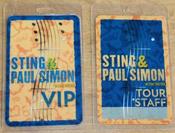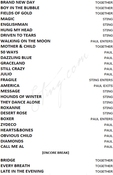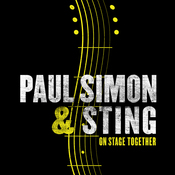
Paul Simon and Sting: On Stage Together
Feb
25
2014
Chicago, IL, US
United Center
1
Sting, Paul Simon at United Center...
Here is a moment pop music mixologists didn't see coming: Sting taking lead vocals of "Bridge Over Troubled Water" while the song's songwriter, Paul Simon, steps in to sing the part of his former partner, Art What's-His-Name. They harmonized so well, they should take it on the road.
In fact, they did. The slicing and dicing of musical eras, styles, and expectations took place at the United Center Tuesday in a double bill that went beyond dual greatest-hits sets for a cohesive, two-hour, 30-minute show that reflected their similarities, not differences. Which is a good thing because, with regards to the latter, there are quite a few.
The staging suggested a battle of the bands: The touring band for each musician situated side-by-side, resulting in a spread of 14 musicians total. But the double-stacked band interacted as a single unit as the evening wore on: Sting guitarist Dominic Miller frequently strolled next to Simon for the pair to exchange instrumental verses on "Fields of Gold," among other songs, while Simon guitarists Vincent Nguini and Mark Stewart provided rhythmic heft for Sting, and provided counterweight when Sting doubled up on bass for "Boy in the Bubble."
The headliners made more deliberate choices in combining their respective songbooks, and finding unexpected ways to link their dual histories. Immediately obvious was their shared love of reggae and Afro-pop, which they confirmed in blending "Walking on the Moon" and "Mother and Child Reunion."
There were duets, harmony singing, and covers. With Simon offstage, Sting introduced "America," the Simon and Garfunkel chestnut, by saying it summoned personal memories of the Police's first North American tour: "It's not only about hope and adventure … but about anxiety and foreboding for the future," he said. He sang the song's lyric with that sense of darkness, until a jackknife turn that led to "Message in a Bottle." Sting also serenaded Simon with classical guitar while the latter took lead vocals with "Fragile."
Comedy wasn't far. The visual oddity Sting, 62, and Simon, 72, presented while onstage together did not go unnoticed. Simon said by the end of the tour, the influence of his stage partner means he may "have more Adonis-like looks and have sex for days on end." When Simon asked Sting how he might change from the experience, the former Police frontman deadpanned, "the same, actually."
During their individual sets, Simon stretched further. He added two covers - the Chet Atkins instrumental "Wheels," and "Mystery Train," the Junior Parker song made famous by Elvis Presley, set to a gentle shuffle. He also introduced more recent fare to his set, particularly "Dazzling Blue" which required the entire slate of musicians to contribute to the thicket of sounds. Simon's fluttering arms accented syllables, mimed lyrical images, and directed attention to the band. The jubilance of "Diamonds on the Soles of Her Shoes," and other signature "Graceland"-era songs remain impervious to harm, even in the abbreviated setting.
As for Sting, this tour coincides with the promotion of a new musical he will premiere in Chicago in June before it shifts to Broadway. He avoided all of that material and instead stuck to requisite hits. A few, particularly "The Dance Alone," sounded so dated, it creaked - Wasn't the soprano saxophone retired last century? Also revived was "I Hung My Head," a song Sting announced as an endorsement of his country music chops - Johnny Cash recorded it before death, after all - but the blaring horns and guitars contradicted that claim.
The duo ended the show together, sharing songs like "Every Breath You Take" that never required two singers, but didn't particularly suffer from both, either. Like the prolonged awkwardness of a blind date, the match-up took time to justify, but ended with inevitable promise.
(c) Chicago Sun-Times by Mark Guarino
Paul Simon and Sting at the United Center...
Here's something you don't see everyday: Sting deferring, complementing, and hanging back. It happened Tuesday at the United Center, with the former Police bassist handling his new role as sidekick to Paul Simon with what appeared to be genuine enthusiasm.
Also just in: Sting can apparently take a joke. Simon - looking for all his frumpiness like he had just emerged from a long, lazy afternoon in his man cave - glanced over at the lean, black-clad Englishman and predicted that merely by basking in the younger singer's aura, he would emerge much more "Adonis-like" at the end of their tour with unrivaled sexual energy. Sting smirked, only to later praise the New Yorker as "one of my teachers and mentors" whose songwriting talents are "humbling and inspiring."
The interaction between two artists with apparently little in common other than their lengthy pedigrees as hitmakers over several decades was among the most anticipated and fascinating attractions of the concert. Not only did Simon and Sting share small talk, they also performed a number of songs together. The night's central revelation was just how good Sting sounded as a harmony vocalist, his reedy voice blending beautifully with Simon's more delicate, workmanlike phrasing on Sting's "Fragile" and Simon's eternal "The Boxer."
As they performed mini sets of their own material and shared the stage with their bands - as many as 14 musicians backed the two singers at various points - their mutual affinity for exotic rhythms unified the sprawling 2 1/2-hour show. Whenever Sting indulged in lethargic ballads ("The Hounds of Winter") and Simon became wrapped up in wordy introspection ("Hearts and Bones"), those Third World grooves righted the course.
Simon's band brought rubbery bass lines, washboard and spoons, percolating hand percussion and sinewy guitar chatter via Africa, Jamaica and Louisiana. Though initially associated with the folk movement in New York, Simon's phrasing is drawn from doo-wop, early rock 'n' roll and R&B. He and his musicians turned Junior Parker's "Mystery Train" into a low-key but hypnotic chug, and then fused it with Chet Atkins' twangy "Wheels." On "You Can Call Me Al," Bakithi Kumalo's addictive fretless bass solo took center stage. Simon played air washboard on the accordion-flavored zydeco romp "That Was Your Mother."
Though Sting could barely utter the Police's name - he merely referred to his old bandmates as "the band" - he drew heavily on the trio's love of reggae. "Roxanne" and "Message in a Bottle" are decent little pop songs that still connect because of their Jamaican flair. A matrix of percolating Algerian rhythms underlined the ululating vocals of "Desert Rose," even as it illustrated the shortcomings of some of Sting's fussier jazz-fusion solo material.
For many, the keeper moments arrived when Sting stepped away from his own material and took on a couple of Simon songs. Even on his delicate acoustic reading of "America" and his duet with the songwriter on "Bridge Over Troubled Water," Sting didn't showboat. Instead, he focused his voice on what mattered and bowed to the songs.
(c) Chicago Tribune by Greg Kot
Here is a moment pop music mixologists didn't see coming: Sting taking lead vocals of "Bridge Over Troubled Water" while the song's songwriter, Paul Simon, steps in to sing the part of his former partner, Art What's-His-Name. They harmonized so well, they should take it on the road.
In fact, they did. The slicing and dicing of musical eras, styles, and expectations took place at the United Center Tuesday in a double bill that went beyond dual greatest-hits sets for a cohesive, two-hour, 30-minute show that reflected their similarities, not differences. Which is a good thing because, with regards to the latter, there are quite a few.
The staging suggested a battle of the bands: The touring band for each musician situated side-by-side, resulting in a spread of 14 musicians total. But the double-stacked band interacted as a single unit as the evening wore on: Sting guitarist Dominic Miller frequently strolled next to Simon for the pair to exchange instrumental verses on "Fields of Gold," among other songs, while Simon guitarists Vincent Nguini and Mark Stewart provided rhythmic heft for Sting, and provided counterweight when Sting doubled up on bass for "Boy in the Bubble."
The headliners made more deliberate choices in combining their respective songbooks, and finding unexpected ways to link their dual histories. Immediately obvious was their shared love of reggae and Afro-pop, which they confirmed in blending "Walking on the Moon" and "Mother and Child Reunion."
There were duets, harmony singing, and covers. With Simon offstage, Sting introduced "America," the Simon and Garfunkel chestnut, by saying it summoned personal memories of the Police's first North American tour: "It's not only about hope and adventure … but about anxiety and foreboding for the future," he said. He sang the song's lyric with that sense of darkness, until a jackknife turn that led to "Message in a Bottle." Sting also serenaded Simon with classical guitar while the latter took lead vocals with "Fragile."
Comedy wasn't far. The visual oddity Sting, 62, and Simon, 72, presented while onstage together did not go unnoticed. Simon said by the end of the tour, the influence of his stage partner means he may "have more Adonis-like looks and have sex for days on end." When Simon asked Sting how he might change from the experience, the former Police frontman deadpanned, "the same, actually."
During their individual sets, Simon stretched further. He added two covers - the Chet Atkins instrumental "Wheels," and "Mystery Train," the Junior Parker song made famous by Elvis Presley, set to a gentle shuffle. He also introduced more recent fare to his set, particularly "Dazzling Blue" which required the entire slate of musicians to contribute to the thicket of sounds. Simon's fluttering arms accented syllables, mimed lyrical images, and directed attention to the band. The jubilance of "Diamonds on the Soles of Her Shoes," and other signature "Graceland"-era songs remain impervious to harm, even in the abbreviated setting.
As for Sting, this tour coincides with the promotion of a new musical he will premiere in Chicago in June before it shifts to Broadway. He avoided all of that material and instead stuck to requisite hits. A few, particularly "The Dance Alone," sounded so dated, it creaked - Wasn't the soprano saxophone retired last century? Also revived was "I Hung My Head," a song Sting announced as an endorsement of his country music chops - Johnny Cash recorded it before death, after all - but the blaring horns and guitars contradicted that claim.
The duo ended the show together, sharing songs like "Every Breath You Take" that never required two singers, but didn't particularly suffer from both, either. Like the prolonged awkwardness of a blind date, the match-up took time to justify, but ended with inevitable promise.
(c) Chicago Sun-Times by Mark Guarino
Paul Simon and Sting at the United Center...
Here's something you don't see everyday: Sting deferring, complementing, and hanging back. It happened Tuesday at the United Center, with the former Police bassist handling his new role as sidekick to Paul Simon with what appeared to be genuine enthusiasm.
Also just in: Sting can apparently take a joke. Simon - looking for all his frumpiness like he had just emerged from a long, lazy afternoon in his man cave - glanced over at the lean, black-clad Englishman and predicted that merely by basking in the younger singer's aura, he would emerge much more "Adonis-like" at the end of their tour with unrivaled sexual energy. Sting smirked, only to later praise the New Yorker as "one of my teachers and mentors" whose songwriting talents are "humbling and inspiring."
The interaction between two artists with apparently little in common other than their lengthy pedigrees as hitmakers over several decades was among the most anticipated and fascinating attractions of the concert. Not only did Simon and Sting share small talk, they also performed a number of songs together. The night's central revelation was just how good Sting sounded as a harmony vocalist, his reedy voice blending beautifully with Simon's more delicate, workmanlike phrasing on Sting's "Fragile" and Simon's eternal "The Boxer."
As they performed mini sets of their own material and shared the stage with their bands - as many as 14 musicians backed the two singers at various points - their mutual affinity for exotic rhythms unified the sprawling 2 1/2-hour show. Whenever Sting indulged in lethargic ballads ("The Hounds of Winter") and Simon became wrapped up in wordy introspection ("Hearts and Bones"), those Third World grooves righted the course.
Simon's band brought rubbery bass lines, washboard and spoons, percolating hand percussion and sinewy guitar chatter via Africa, Jamaica and Louisiana. Though initially associated with the folk movement in New York, Simon's phrasing is drawn from doo-wop, early rock 'n' roll and R&B. He and his musicians turned Junior Parker's "Mystery Train" into a low-key but hypnotic chug, and then fused it with Chet Atkins' twangy "Wheels." On "You Can Call Me Al," Bakithi Kumalo's addictive fretless bass solo took center stage. Simon played air washboard on the accordion-flavored zydeco romp "That Was Your Mother."
Though Sting could barely utter the Police's name - he merely referred to his old bandmates as "the band" - he drew heavily on the trio's love of reggae. "Roxanne" and "Message in a Bottle" are decent little pop songs that still connect because of their Jamaican flair. A matrix of percolating Algerian rhythms underlined the ululating vocals of "Desert Rose," even as it illustrated the shortcomings of some of Sting's fussier jazz-fusion solo material.
For many, the keeper moments arrived when Sting stepped away from his own material and took on a couple of Simon songs. Even on his delicate acoustic reading of "America" and his duet with the songwriter on "Bridge Over Troubled Water," Sting didn't showboat. Instead, he focused his voice on what mattered and bowed to the songs.
(c) Chicago Tribune by Greg Kot
Comments
1
February 26, 2014
posted by Kimberly1967
Sting's gift to Paul
Sting was full of grace in Chicago. I've never seen him use his gifts to earnestly support a fellow musician by subordinating himself, yet all the while maintaining his sense of self. It was a privilege and a delight to witness. My impression is that Sting has a momentous stride that cannot be broken, so he reached out to take the hand of Paul Simon, his dear friend, to share the warmth of the limelight for a time while on his journey. I was surrounded by a throng of truly grateful fans to see Paul back on stage. It was touching to see Sting cupping his hand over his right ear to ensure that the harmonies he provided were approaching his best efforts, if not perfection. True fellowship. Bravo!
Newer comments 1 - 1 of 1 Older comments







